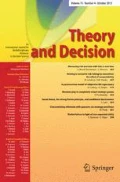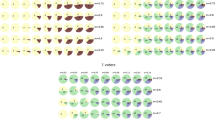Abstract
The paradox of new members occurs when the addition of one or more new members to a weighted voting body increases, rather than decreases, the voting power of some of the old members. Extending the computational work of Brams and Affuso (1976), the mean size of the paradox and the relative frequency of its occurrence are presented for small and moderate-size weighted voting bodies. Computational results are presented and conclusions are drawn for the two power indices of Shapley-Shubik and Banzhaf, three different decision rules, and voting bodies with or without dictator. Although the paradox cannot be dismissed as either contrived or improbable, its mean size in moderatesize voting bodies is sufficiently small to question its practical significance.
Similar content being viewed by others
References
Banzhaf, J. F., III: 1965, ‘Weighted voting doesn't work: A mathematical analysis’, Rutgers Law Review 19, 317–343.
Brams, S. J.: 1975, Game Theory and Politics, Free Press, New York.
Brams S. J.: 1976, Paradoxes in Politics, Free Press, New York.
Brams, S. J. and Affuso, P. J.: 1976, ‘Power and size: A new paradox’, Theory and Decision 7, 29–56.
Dreyer, J. S. and Schotter, A.: 1980, ‘Power relationships in the International Monetary Fund: The consequences of quota changes’, The Review of Economics and Statistics 42, 97–106.
Dubey P. and Shapley, L. S.: 1979, ‘Mathematical properties of the Banzhaf power Index’, Mathematics of Operations Research 4, 99–131.
Fischer, D. and Schotter, A.: 1978, ‘The inevitability of the “paradox of redistribution” in the allocation of voting weights’, Public Choice 31, 49–67.
Lucas, W. F.: 1976, ‘Measuring power in weighted voting systems’, Case Studies in Applied Mathematics, C.V.P.M. Mathematical Association of America, pp. 42–106.
Nijenhuis, A. and Wilf, H. S.: 1978, Combinatorial Algorithms for Computers and Calculators, 2nd Edition, Academic Press, New York.
Raanan, J.: 1976, ‘The inevitability of the paradox of new members’, Technical Report No. 311, School of Operations Research and Industrial Engineering, Cornell University, September.
Riker, W. H. and Ordeshook, P. C.: 1973, Positive Political Theory, Prentice Hall, Englewood Cliffs, New Jersey.
Shapley, L. S.: 1962, ‘Simple games: An outline of the descriptive theory’, Behavioral Science 7, 59–66.
Shapley, L. S. and Shubik, M.: 1954, ‘A method for evaluating the distribution of power in a committee system’, American Political Science Review 48, 787–792.
Straffin, P. D. Jr.: 1978, ‘Probability models for power indices’, in P. C. Ordeshook (ed.), Game Theory and Political Science, New York University Press, New York.
Author information
Authors and Affiliations
Rights and permissions
About this article
Cite this article
Rapoport, A., Cohen, A. Expected frequency and mean size of the paradox of new members. Theor Decis 17, 29–45 (1984). https://doi.org/10.1007/BF00140054
Issue Date:
DOI: https://doi.org/10.1007/BF00140054




